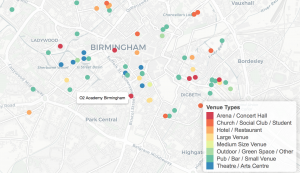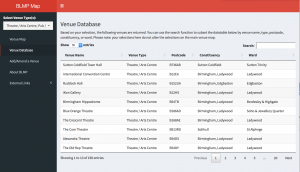What are we missing? ‘Add or amend a venues’
The map represents the beginning of the third of five phases of data collection and development (see below), and in particular signals the start of a crowdsourcing initiative that we hope will enable our research project to produce the first ever comprehensive map of the Birmingham’s music venues. In order to do that we need your help!
So far, the project has gathered information for the majority of the main and major sites of live music in the city. As you explore the map, you will see large venues such as the Symphony Hall and the O2 Academy, and also smaller-t0-medium sized spaces such as The Glee Club and The Hare and Hounds. However, and although the map currently shows x venues, we are certain that this does not represent the full picture of live music in the city.
This is where you come in. Can you can help us complete the picture by telling us about venues and space that are not in the map?
- Is there a Social Club in your local area that has a regular live music event?
- Is there a cafe or restaurant you go to that has an Open Mic night?
- Do you attend a regular live music event at your school or place of worship?
- Does live music happen in unexpected places – do you have live music at your Sports club, or place of work?
If the answer to any of the questions above is YES, please do consider telling BLMP about it using the form on the map (click on Add/Amend a venue) or by clicking here.
You can also assist the project by sharing the map with your friends and family and by encouraging them to share the map. We’re trying to reach as many different people and communities in the Birmingham area as possible, as this will increase the likelihood of us being able to gather a fuller picture of live music in the city. So, please do email or share the map link with your networks. Once again, this link is as follows:
https://birmingham.livemusicresearch.org/map
Data collection and map development phases
PHASE ONE (Jan-Mar 2020) Webscraping
An initial phase of web-scraping gathered information on Birmingham music venues from the Songkick database (see this post for an overview of that process). This produced a partial list of venues and venue information, including venue names, addresses and postcodes.
The data generated in this phase was then verified and augmented by a team of 3 BLMP student assistants, who used the Songkick data as the basis for an internet search for each venue. During this phase, the research team organised venues into categories, added additional information (including social media and website links), producing a dataset of 108 venues.
PHASE TWO (Mar-May 2020) Online Research
The BLMP student assistants then manually searched the internet for additional music venues not present in the Songkick database. Working through each Parliamentary constituency in the covered by a B-prefix postcode in turn, they added a further 90 venues to the database. Giving a total of 198 venues.
Based on postcode information now present in the database for each venue, the research team engaged in further web-scraping to gather supplementary data – this included information such as the nearest train station to a given venue, and the parliamentary constituency a venue was located within.
This information was combined to create the currently available version of the BLMP Map, which was created using R and deployed as a Shiny application. See my personal website for a technical overview of that process.
PHASE THREE (June-August 2020) Crowdsourcing
With the launch of the BLMP Map on Monday 1st June 2020, the project entered a Crowdsourcing phase. The publicly available map contains a webform that enables local industry stakeholders and public to provide additional venue information in one of two ways:
- Venues missing from the map can be added
- Amendments to information about existing venues in the map can be suggested.
PHASE FOUR (July-August 2020) Verification
BLMP’s team of student assistants will monitor information submitted during the crowdsourcing phase. New venues added via the online form will be checked using internet searches and – where possible – direct contact with venue owners and managers. Likewise, suggested amendments will be verified against available information. Once additions or amendments have been verified, they will be added to the venue database.
PHASE FIVE (August-December 2020) Map v2.0
Based on the information gathering and verified in earlier stages, a new version of the BLMP Map will be published before December 2020.



